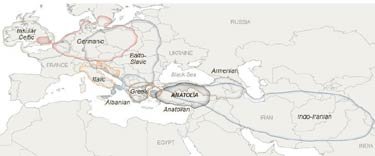Origin Point of Indo-European: Anatolia?
Indo-European, Language
The New York Times reports another classic example of reasoning by computer program. This time the result is support for the “peaceful agriculturalist and Anatolian” theory of the origins of Indo-European.
Biologists using tools developed for drawing evolutionary family trees say that they have solved a longstanding problem in archaeology: the origin of the Indo-European family of languages.
The family includes English and most other European languages, as well as Persian, Hindi and many others. Despite the importance of the languages, specialists have long disagreed about their origin.
Linguists believe that the first speakers of the mother tongue, known as proto-Indo-European, were chariot-driving pastoralists who burst out of their homeland on the steppes above the Black Sea about 4,000 years ago and conquered Europe and Asia. A rival theory holds that, to the contrary, the first Indo-European speakers were peaceable farmers in Anatolia, now Turkey, about 9,000 years ago, who disseminated their language by the hoe, not the sword.
The new entrant to the debate is an evolutionary biologist, Quentin Atkinson of the University of Auckland in New Zealand. He and colleagues have taken the existing vocabulary and geographical range of 103 Indo-European languages and computationally walked them back in time and place to their statistically most likely origin.
The result, they announced in Thursday’s issue of the journal Science, is that “we found decisive support for an Anatolian origin over a steppe origin.†Both the timing and the root of the tree of Indo-European languages “fit with an agricultural expansion from Anatolia beginning 8,000 to 9,500 years ago,†they report.
But despite its advanced statistical methods, their study may not convince everyone.
Results of these kinds of automated analyses inevitably derive from assumptions already programmed in. I’m afraid I think it seems abundantly obvious that peoples speaking Indo-European languages, though they may engage in farming, are historically anything but peaceful. Still, all this is interesting enough to give it a look over.




